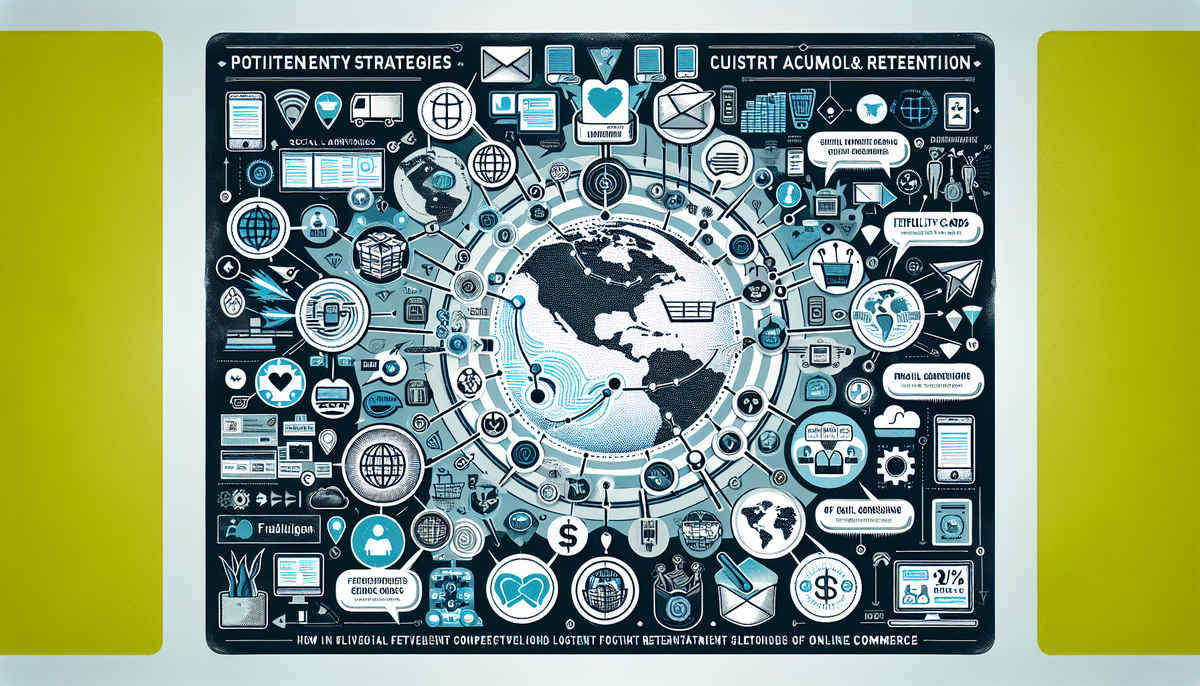The Power of AI in Scaling Ecommerce Businesses
The ecommerce industry is growing at an unprecedented rate. According to Statista, the global revenue from ecommerce sales is expected to surpass $6.3 trillion by 2024. This growth means that online retailers must find innovative ways to stay ahead of the competition and scale their businesses. One such method is leveraging the power of artificial intelligence (AI) in ecommerce. In this article, we will delve into the details of AI, its benefits, and how it can be used to improve customer experience and drive sales.
Understanding AI in Ecommerce
What is AI and How Does it Work in Ecommerce?
Artificial Intelligence (AI) is a technology that enables machines to perform tasks that typically require human intelligence. In ecommerce, AI algorithms analyze data, learn from it, and make predictions. This helps retailers understand consumer behavior, personalize marketing efforts, and optimize product recommendations.
The most common AI applications in ecommerce include:
- Product recommendations
- Personalized email campaigns
- Chatbots and virtual assistants
- Inventory management
These AI-powered systems enable retailers to provide a superior shopping experience, leading to increased sales and customer loyalty.
Key AI Technologies in Ecommerce
Several AI technologies are pivotal in transforming the ecommerce landscape:
- Machine Learning: Enhances predictive analytics and personalization.
- Natural Language Processing (NLP): Powers chatbots and virtual assistants.
- Computer Vision: Enables image-based search and product tagging.
- Robotic Process Automation (RPA): Automates repetitive tasks such as inventory management.
The Benefits of Using AI in Ecommerce
Enhanced Product Recommendations
AI improves the accuracy of product recommendations, reducing the likelihood of abandoned carts. By analyzing past behavior and preferences, AI can suggest items that customers are more likely to purchase.
Optimized Pricing Strategies
AI enables dynamic pricing strategies by analyzing market trends, competitor prices, and consumer demand in real-time. This helps retailers set optimal prices that maximize profits while remaining competitive.
Personalized Marketing Campaigns
With AI, retailers can create highly targeted marketing campaigns. By segmenting customers based on their behavior and preferences, AI ensures that marketing messages resonate with each individual, increasing engagement and conversion rates.
24/7 Customer Support
AI-powered chatbots provide round-the-clock customer support, handling inquiries and resolving issues promptly. This improves efficiency and customer satisfaction while reducing operational costs.
Improving Customer Experience with AI
Personalized Shopping Experience
AI enables retailers to offer personalized shopping experiences by analyzing consumer data and providing tailored product and content recommendations based on individual interests and past behavior.
Website Optimization
AI analyzes user behavior on ecommerce websites to identify areas for improvement in the user interface and design. Optimizing these elements enhances the shopping experience, leading to higher conversion rates.
Efficient Customer Service
AI-powered chatbots can handle routine tasks such as order tracking and returns, freeing up customer service representatives to address more complex issues. This results in a better overall customer experience.
Fraud Detection and Prevention
AI analyzes transaction data to identify and flag potentially fraudulent activities. This not only protects retailers from financial loss but also maintains customer trust and confidence in the brand.
Leveraging AI to Drive Sales and Increase Revenue
Dynamic Pricing
AI algorithms analyze buyer behavior to adjust pricing in real-time. For example, offering a discount when a consumer is about to abandon their cart can lead to increased sales and customer loyalty.
Personalized Promotions
AI creates personalized promotions tailored to each customer's unique interests, increasing the likelihood of purchase and boosting overall revenue.
Demand Forecasting
AI predicts future trends and demand patterns by analyzing data from various sources such as social media, search engines, and customer reviews. This helps retailers make informed decisions about inventory management and product development.
AI-Powered Personalization: Customizing the Shopping Experience
Personalized Product Recommendations
By analyzing consumer data, AI provides product recommendations that align with individual preferences and past behavior, enhancing the shopping experience and increasing sales.
Targeted Email Campaigns
AI algorithms enable the creation of personalized email campaigns that cater to the unique preferences of each consumer, resulting in higher engagement rates and more sales.
Real-Time Assistance
AI-powered chatbots assist customers in real-time, helping them navigate the website, answer queries, and provide personalized recommendations.
Predictive Customer Insights
AI identifies potential customers likely to make a purchase by analyzing consumer data, allowing retailers to provide personalized offers and discounts that encourage conversions.
The Future of Ecommerce: AI-Driven Innovation
Voice and Image Recognition
AI-driven voice and image recognition technologies allow customers to search for products using voice commands or by uploading images, offering a more intuitive and seamless shopping experience.
Supply Chain Optimization
AI utilizes predictive analytics and machine learning to optimize inventory management, reduce waste, and improve delivery times, enhancing both retailer efficiency and customer satisfaction.
Advanced Personalization
Future AI advancements will enable even more sophisticated personalization, further enhancing the shopping experience and fostering customer loyalty.
The Ethical Implications of AI in Ecommerce
Data Privacy and Transparency
Retailers must be transparent about the data they collect and how it is used. Ensuring customer data is protected from misuse or unauthorized access is paramount.
Bias and Fairness
AI algorithms must be designed to avoid perpetuating existing biases or unfairly discriminating against certain groups, ensuring fair treatment for all customers.
Job Displacement
As AI automates certain roles, there is a potential for job displacement. Retailers need to consider the impact on their workforce and implement strategies to mitigate negative effects.
Customer Consent
Customers should have control over their data. Providing options to opt-out of certain data collection activities respects customer privacy and builds trust.
Implementing AI in Your Ecommerce Strategy: Tips and Best Practices
Define Clear Objectives
Start with a clearly defined problem or objective that AI can address effectively within your ecommerce strategy.
Choose the Right AI Technology and Vendor
Select AI tools and vendors that align with your business needs and have a proven track record in ecommerce.
Ensure Data Quality
Maintain clean and accurate data to train AI algorithms effectively, ensuring reliable and actionable insights.
Continuous Monitoring and Refinement
Regularly monitor AI performance and refine algorithms to adapt to changing market conditions and consumer behavior.
Educate and Involve Your Team
Provide training and foster a culture that embraces AI technology, ensuring your team is equipped to utilize it effectively.
Successful Examples of AI in Ecommerce
Amazon
Amazon uses AI algorithms to create personalized product recommendations, resulting in increased sales and customer loyalty. Their recommendation system accounts for up to 35% of their sales.
Alibaba
Alibaba leverages AI to optimize pricing strategies, enhancing revenue and maintaining a competitive pricing structure. Their AI-driven initiatives have significantly improved operational efficiency.
Shopify
Shopify integrates AI tools to help merchants analyze sales data, predict trends, and personalize marketing efforts, leading to better business outcomes.
Overcoming Challenges in Implementing AI in Ecommerce
Data Quality Issues
Ensure data is clean, accurate, and relevant to avoid skewed AI insights and decisions.
Limited IT Resources
Partner with experienced AI vendors or consultants to support the implementation process effectively.
Employee Resistance
Educate and involve employees in the AI adoption process to reduce resistance and foster a culture of innovation.
Integration with Existing Systems
Ensure that AI tools can seamlessly integrate with your current ecommerce platforms and systems for optimal performance.
Conclusion
AI is a transformative technology reshaping the ecommerce landscape. By leveraging AI, retailers can create personalized shopping experiences, optimize pricing strategies, and enhance customer service. Despite ethical considerations such as data privacy and job displacement, the benefits of AI in ecommerce are undeniable.
To maximize AI's potential, retailers must implement the right tools and processes, continuously monitor and refine AI algorithms, and ensure ethical practices. By doing so, they can stay ahead of the competition, drive sales, and provide an exceptional shopping experience for their customers.






















